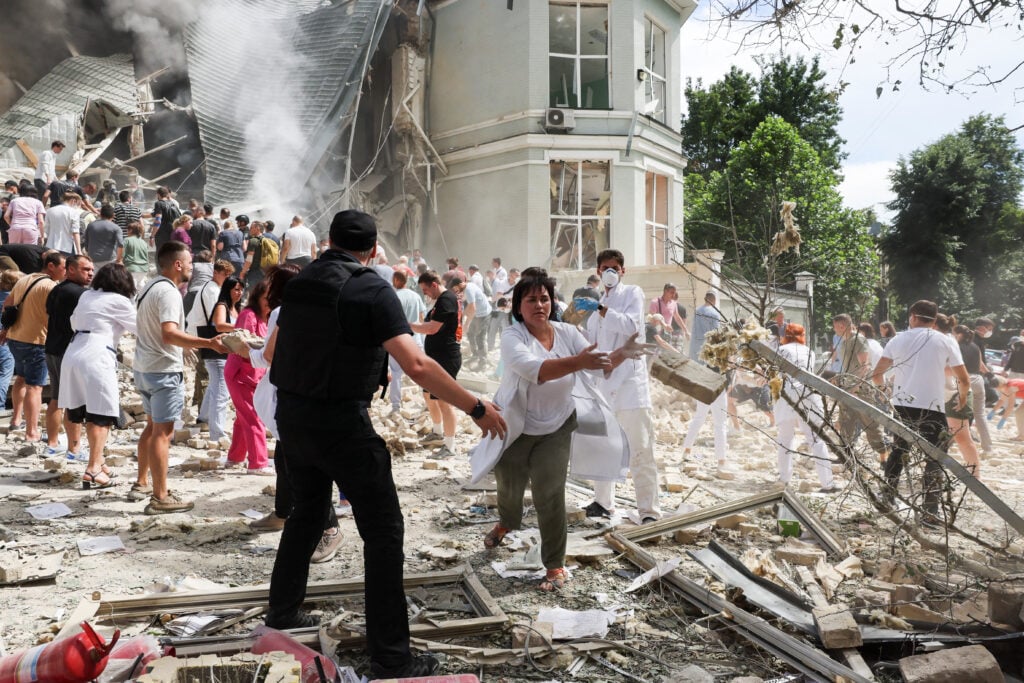By Olha Fokaf, for UkraineAlert
The bombing of Ukraine’s largest children’s hospital in Kyiv on July 8 has sparked a wave of global condemnation, with US President Joe Biden calling the attack a “horrific reminder of Russia’s brutality.” Meanwhile, others have noted that this latest airstrike was not an isolated incident. “Once again, Russia has deliberately targeted residential areas and healthcare infrastructure,” commented France’s representative at the UN.
Ever since the start of Russia’s full-scale invasion almost two and a half years ago, the Kremlin has faced repeated accusations of deliberately targeting Ukrainian medical facilities. On the first anniversary of the invasion, CNN reported that “nearly one in ten” Ukrainian hospitals had been damaged as a result of Russian military actions. Underlining the frequency of such incidents, Kyiv’s Okhmatdyt Children’s Hospital was one of three separate Ukrainian medical facilities to be struck by Russian missiles on July 8.
The Russian military has killed a large number of Ukrainian healthcare professionals over the past two and a half years. Monday’s bombings resulted in the deaths of an least six Ukrainian medics. They joined hundreds of colleagues from the healthcare industry who have been killed since the invasion began. Russian military actions have also resulted in billions of dollars worth of damage to Ukrainian healthcare facilities. In many cases, this has made it impossible to continue providing essential medical support, leading to significant further human costs.
The campaign against Ukraine’s healthcare infrastructure is in no way exceptional and appears to align with Russian military doctrine. Similar patterns of attacks on clinics and hospitals have been identified during Russian military campaigns in Syria, Georgia, Chechnya, and beyond. Unless Russia can be held accountable for the targeting of healthcare infrastructure, it potentially opens the door for other countries to adopt similar military tactics in future conflicts.
According to international humanitarian law, healthcare institutions and medical personnel are afforded specific and enhanced protection in conflict zones. Despite this status, Russia is accused of systematically targeting medical facilities across Ukraine. These attacks have been documented by the “Attacks on Health Care in Ukraine” project, which is run by a coalition of Ukrainian and international civil society organizations.
In addition to direct military attacks on healthcare infrastructure, research carried out by this civil society initiative has also identified a clear pattern of Russian behavior in occupied areas involving restricted access to essential healthcare services. Throughout regions of Ukraine that are currently under Kremlin control, the occupation authorities reportedly withhold medical care unless Ukrainians accept Russian citizenship and are otherwise cooperative.
It is also crucial to acknowledge the indirect impact of the Russian invasion on Ukrainian healthcare. The war unleashed by Vladimir Putin in February 2022 has created a range of long-term challenges including unprecedented demographic changes and a dramatic increase in mental health disorders. The healthcare ramifications of Russian aggression extend beyond Ukraine’s borders, including the burden placed on foreign healthcare systems by millions of Ukrainian refugees fleeing the war.
Prosecuting Russia for war crimes related to the targeting of Ukraine’s healthcare infrastructure is likely to be an extremely challenging and time-consuming process. Potential obstacles include slow judicial systems, difficulties in identifying individuals responsible for deliberate attacks, and problems establishing clear links between the perpetrators and the crime. Collecting evidence that meets international prosecution standards is also a complex task during ongoing combat operations.
In order to break the cycle of impunity, the international community must prioritize the investigation and prosecution of those who deliberately target healthcare infrastructure and medical personnel. This process should involve international and domestic legal systems along with the relevant UN investigative bodies.
Russia is clearly targeting the Ukrainian healthcare system and weaponizing the provision of medical services as part of a campaign aimed at breaking Ukrainian resistance and strengthening Moscow’s grip on occupied regions of the country. Unless there is accountability for these crimes, Russia’s actions will set a dangerous precedent that will lead to similar offenses in other conflict zones.
Olha Fokaf is a healthcare specialist currently serving as a consultant to the World Bank in Kyiv.





